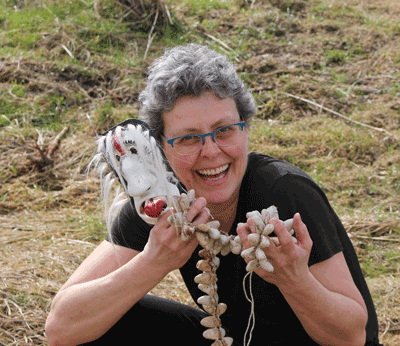Helena Simonett - April 20, 2017 - 2:40 p.m. - SFA 101
Title: Yoreme Cocoon Leg Rattles: An Eco-organological Study of a Unique "Sound Maker"

Description: Filled with pebbles and strung together, the cocoons of a giant silk moth from Mexico’s northwestern coast have served as leg rattles in ceremonies — most likely since ancient times, given that rattling instruments were used throughout Mesoamerica in agricultural fertility rites. Agribusinesses nowadays, however, rely on fertilizers, herbicides, and pesticides, not rattles and ceremonies, to increase crop yield. These pollutants negatively affect the functioning of the ecosystem — a system that has been the basis of indigenous lifeways and cosmology for millennia. Through the cocoon rattles we will see how Yoreme cultural life is embedded in an ecological worldview that clashes with the economic reality of an export-oriented agricultural industry that, ironically, also sustains their livelihood.
Brief Bio: Helena Simonett received her PhD in ethnomusicology from the University of California, Los Angeles. She is currently Senior Research Associate at the Lucerne University of Applied Sciences and Arts, Switzerland. She conducted extensive research on Mexican popular music and its transnational diffusion and explores the role of indigenous ceremonial music and dance in northwestern Mexico. Her publications include Banda: Mexican Musical Life across Borders (2001) and En Sinaloa nací: historia de la música de banda (2004). She is editor of The Accordion in the Americas: Klezmer, Polka, Tango, Zydeco, and More! (2012) and (with Javier León) of A Latin American Music Reader: Views from the South (2016). With Bernardo Esquer López, she produced the children’s book Ca’anáriam — Hombre que no hizo fuego (2012) in Yoreme and Spanish language (with English translation).


